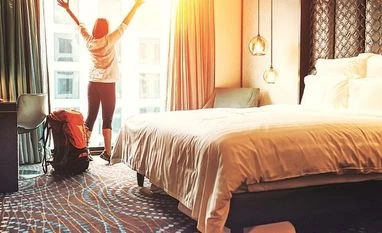The trend of more people travelling and at frequent pace has prompted hotels to embark on an aggressive expansion plan in leisure destinations. Hotel companies of all hues — budget, mid-scale, and upscale — are looking to add an estimated 20,000 rooms in the country’s top 10 tourist destinations, as they seek to make the most of the boom in the domestic tourism sector, according to Noesis Capital Advisors, a hotel consulting firm.
The bulk of India’s leisure spending is on domestic travel at 87 per cent and the remaining on international travel. A pricing premium which these locations enjoy over their counterparts in metro cities is also prompting companies to commit higher investments.
“A relatively lower cost of development of assets in these regions, coupled with an increasing purchasing power of domestic travellers, is making such destinations attractive for hotel companies,” says Nandivardhan Jain, chief executive at Noesis Capital.
Among other things, the expansion is being driven by the changing travel trends, says Zubin Saxena, managing director and vice-president (operations) at Radisson Hotel group. Unlike the past, vacationers now prefer to head out more frequently for shorter duration instead of taking one long break. Improved flight connectivity to tertiary cities has also helped.
“Everyone wants to take a short break. It’s not always desirable to take a long, overseas vacation. Hence, leisure destinations in India are gaining more prominence,” says Saxena. And Radisson is looking to ride the wave. For instance, in Jammu & Kashmir alone, it plans to sign up seven new hotels. Starting from Sonmarg later this year, all these will be operational over the next three to five years.
India led the way on leisure travel spends, accounting for 94.8 per cent of its total gross domestic product contribution, beating countries like the US and China, which were at 71.3 per cent and 81.4 per cent, respectively, according to the World Travel and Tourism Council.
So why is everyone making a beeline for leisure locations? Leisure hotels continue to outperform their urban counterparts, recording to a RevPAR (revenue per available room) premium of 61.8 per cent in 2017-18, mainly on the back of higher average rates, says Manav Thadani, founder and chairman at Hotelivate, a hotel consulting firm.
At Rs 14,292, the average rate of leisure hotels in the index was nearly twice that of urban hotels (Rs 7,831), growing 7 per cent over the previous year, says Thadani.
Jean-Michel Cassé, chief operating officer, India & South Asia, Accor, says, “The lifestyle market continues to grow rapidly and has one of fastest growth rates in the industry,” adding, “Over the next few years, the company plans to grow its regional network and introduce new brands”. The world’s second-largest hospitality chain over the next three to five years has 5,000 keys in the pipeline. Many of these will be in leisure locations, including the upcoming Raffles in Udaipur and Jaipur, and Fairmont in Goa.
It’s also boom time for regional players like Uttarakhand-based Leisure Hotels that operates hotels under its own brands, in addition to running management contracts with Indian Hotels and running a lease agreement with Club Mahindra. To tap into the growth opportunity, it plans to add another 500 rooms to its portfolio of 900 rooms. “Large brands are not very successful in the leisure markets, even as they do very well in the business centres. Hence, there is a need for brands such as ours,” says Vibhas Prasad, director, Leisure Hotels.
“With a large young population/demographic driven more by energies, the demand from domestic tourism has a strong potential for high growth rates,” says Dipak Haksar, chief executive, ITC Hotels and WelcomHotels. Over the past couple of years, the company has aggressively grown its leisure footprint in destinations and is in talks for signing up hotels in Corbett, Coorg, Rajasthan, and Andhra Pradesh. These will be for ITC’s luxury hotels and WelcomHotel brands.
Others are also looking to make the most of it. “We are aggressively chasing opportunities in developed resort locations,” says Rattan Keswani, deputy managing director (MD), Lemon Tree Hotels. The number of Indian travellers seeking such destinations for customised experiences with a higher spend capability is increasing manifold, says Keswani. The New Delhi-based hotel plans to add over 350 rooms in Rishikesh, Bhutan, Coorg, Dwarka, Alwar, Gulmarg, Sonmarg, and Nepal between the Lemon Tree and Lemon Tree Premier brands. It will also be opening a hotel in Udaipur with its yet-to-be-announced new upscale brand.
Even as hotels remain bullish, they maintain disruption in the domestic aviation market, following the Jet Airways crisis, can play spoilsport. “I just hope the current crisis in the aviation space is sorted out sooner rather than later, as it may mar growth prospects,” says Ajay Bakaya, MD at Sarovar Hotels and Resorts.
Unlock 30+ premium stories daily hand-picked by our editors, across devices on browser and app.
Pick your 5 favourite companies, get a daily email with all news updates on them.
Full access to our intuitive epaper - clip, save, share articles from any device; newspaper archives from 2006.
Preferential invites to Business Standard events.
Curated newsletters on markets, personal finance, policy & politics, start-ups, technology, and more.
)